In our Build Your Audience + Traffic series, we’ve been busy mapping out a heavyweight blog and social media plan, one that’ll knock the socks off any pro blogger.
We covered the importance of researching blog post ideas on the first of every month so that you know what to write, and today, I want to look at HOW to research.
Coming up with blog ideas is something that can easily cause you stress, especially when you’ve been blogging for a while. There will be days when you get writer’s block and can’t put pen to paper. Maybe you feel like you’ve written every word you can imagine and explored every angle of your blog themes.
I feel your pain. It’s happened to me many times. You start to feel drained and think, “What else can I possibly write about?
That’s where research comes in. Knowing how to go about finding new ideas that your audience will love is crucial if you want to build a blog that drives business.
In this post, I’m sharing three of my favorite sources for ideas. Think of this as an addendum to the Build Your Audience + Traffic series.
3 Places to Find Unique Blog Post Ideas
1) Keyword Research
This is more of an action-item than a place. But there are a few keyword research tools I use that I think you’ll find helpful too.
Before we get into this, I’ve learned the hard way that you can’t stuff keywords in your posts and hope to get them on page #1. Google doesn’t play that game, so neither can you. Still, keyword research is my first stop when I’m stumped about what to write, and below I share the tools I use.
Keyword research will also help your posts rank higher on Google.
Keyword Planner
When I’m brainstorming ideas for blog content, Keyword Planner is where I start.
What you’re looking for with this tool are keywords with a high monthly search volume and low competition. Before the 2017 update, it was easy to find that data. Now it’s a bit harder because you only see a range, such as 1K – 10K, which is helpful as a starting place, but we can’t leave it there and here’s why:
- The range given can be hugely inaccurate, as you’ll see below.
- There’s a huge difference in traffic between 1K and 10K searches.
So how do we get the data we really need?
Let’s walk through a typical search. First, enter your keyword into the planner, like this:
You can also filter the keywords and customize your search. I like to see results for at least 1,500 average monthly searches, so I filter my keywords like this:
On the next screen, I recommend clicking on the Competition tab and sorting by low competition, so that “Low” appears first and you can see the keywords that are easier to rank.
To the left of the competition column is the Average Monthly Search column, which is what we need to dig into to see the actually monthly volume, instead of a range. Click on the arrows next to the keywords you want more data for. This will add them to your plan. When you have all the keywords you want, click “Review Plan.”
This next screen is much more helpful for keyword research. On this screen, click the Keyword tab, enter a high bid ($150 or more to see all results). Then, at the bottom under Match Types, select “Exact Match.”
Now you can see the actual monthly search volume (Impressions column) which is ginormously different than the range we got before.
See how powerful this extra step is? I was all set to target the keyword blog post ideas because it looked like the search volume was decent. Ha! Fool me once, never again. In reality, there are only 48 searches and even fewer for “blog topic ideas,” which is another keyword I was considering. But “blog ideas” is looking pretty good at 2,400+ searches, so I’ll use that instead. As a general rule, I shoot for 1,500 searches or more for target keywords.
One of the best things about this tool is that you see related keywords. These other keywords can (and should) be used in your post to help Google understand the context of your content. Plus, since you know that people are actively searching for these terms, you can add them to your list of future ideas for blog content.
Note: You can get actual search volume results without this workaround if you create an ad campaign. You don’t have to activate your ads to see the data either. Just enter your credit card and set up a mock campaign with ad groups + ads. Then put everything on pause and use the planner.
LSI Graph
LSI stands for latent semantic indexing, which is a fancy way of saying “related keywords”. The LSI Graph is a tool that helps you find them. For instance, here are LSI keywords I get from “blog post ideas”:
All of these LSI keywords are related to the keyword “blog post ideas.” Some of the keywords will be the same as the Keyword Planner, and oftentimes you’ll find new ones.
LSI keywords are helpful in two ways. First off, they give you ideas for other posts, or even a new angle on a post you’re already writing. Secondly, it’s important to include LSI keywords in your content so that Google understands what your post is about. The more related keywords you have in your post, the more signals you send to Google that it should show your page for these search terms.
Google Search Results
And if you’re looking for even more blog ideas and related keywords, scroll down to the bottom of Google next time you search for something. You’ll see related keywords, like this:
If the keywords show up here, that’s a good indication that people are searching for them.
When you’re ready to optimize your posts, I recommend using the 3 tools mentioned above to refine your keywords and narrow down your ideas.
Related: The Ultimate SEO Guide for Bloggers and Entrepreneurs
2) BuzzSumo
BuzzSumo is a tool that many people use and one that I’ve tried too. The idea here is to search for popular blog topics and posts with the most shares, repins and retweets, then look at how/if you can improve upon them.
For example, here’s what shows up for the keyword “blog post checklist”:
Let’s say you want to write a post with blog post checklist as your topic.
The first thing to do is to think about how you can make yours better and put your spin on it. Will yours be longer, prettier, have more details, more fun, lit up with a fresh perspective? You might even use a spreadsheet for your research, where you jot down each blog post title and URL with your ideas next to it.
Can you see what a great tool this is? Just knowing what people are sharing is going to help us frame our own content, and quick like, too.
Before we give it a high-five, there’s a catch: It costs a whopping $99 a month, which is just crazy.
So, what do we do?
I recommend playing with the free trial just for giggles. You’ll have 2 weeks to poke around, see what results you get, find the most shared blog topics and do them one better. Then, because we don’t like subscriptions gobblin’ up our profits, let’s see if we can get similar insights with Pinterest for FREE.
This shouldn’t be hard to do. For starters, Pinterest is more than a social media site. It’s actually a search engine much like Google, which means that you can easily find pins with high engagement, comments, and repins.
Just look at all this beautiful content:
Oh, and those blog titles I mentioned? Make sure you look at those too. They’re a much bigger deal than you might think, especially if you want people to click through and read your post. I’ve got 120+ Blog Post Title Templates that will help you out here. All you have to do is fill in the blanks. Trust me, these are so helpful when you’re about to hit publish and get hit with writer’s block!
Related: 55 Insanely Easy Ways to Boost Your Blog Traffic
This leads me to…
3) Social Media and Social Communities
A great place to find popular blog posts and content ideas. I use Pinterest the most because that’s where I get the bulk of my traffic and that’s where my audience is. When I’m really stumped for ideas, I branch out to Facebook and other social communities and forums.
Facebook groups are great for promoting your content, brainstorming ideas, and meeting like-minded people.
I’ve already talked about how to join groups and manage promo days here. Now let’s look at how we can leverage the same groups to get relevant blog topic ideas for future posts (or even products!).
Once you join a few groups, you’ll see that some are strictly promo, and that’s perfectly ok. In those groups, you’ll promote your posts and leave it at that. You’ll find other ones, like the Blog Boosters group I’m in, where people are actively sharing, answering questions, asking for advice, and so on. These are the groups that will give you a mountain of blog ideas.
I recommend spending a few minutes each day bopping around to see if there’s a question you can answer, or better yet, write a post about. Whenever I see the same question asked over and over again, I know it’s a good blog topic. It goes right on my editorial calendar.
For instance, here’s yet another Pinterest question from Blog Boosters:
I’m gonna do it! This one’s going on my planner for a future post. I’ve answered so many questions like these. It’s definitely time for another Pinterest throwdown.
What questions do you answer over and over again? Now we’re killin’ it, see?
Seriously, I’m freaked by Reddit. It’s a scary place, just sayin’. I’ve been banned from enough subreddits that I’ve backed off sharing my posts there lately. Redditors hate anything that looks, smells or sounds spammy and they can spot marketers a mile away.
Still, it’s a great place to get blog ideas. Join a few subreddits related to your niche, then use the search bar to look for “how do you” threads, like this one from r/smallbusiness:
I’ve seen enough questions like these in my subreddits to write something about keeping your enthusiasm and working a side hustle.
Quora
Another great place for blog ideas. To start, you need to sign up for Quora using your Gmail and select topics that are relevant to your audience. For example, here are my topics:
Once you’ve chosen your topics, related questions will appear in your feed. If you’re really savvy, and I know you are, you’ll poke around in here every week. See what questions you can answer and then fire away with a link to your post. Quora is fantabulous for traffic!
This is also a perfect place to find content for blog posts. Here are the top questions in my SmallBusiness feed:
See that one in red? That’s great inspiration for a “start your business on a budget” post. Bump.
Related: Why You Need a Social Media Strategy (And How to Create One that Works)
So there you have it! These are my favorite places to find blog ideas.
You know what another one is? My ears. That’s 2 places, I know, but you get my gist: listen with an intent to write. Look through your blog comments, look at the comments of other popular blogs in your niche, listen to what people say/ask when you speak to them one-on-one. What questions pop up most frequently?
Chances are you’ll see/hear a lot of the same questions on Facebook, Pinterest, Google, BuzzSumo, Reddit, Quora, and in- -person. I bet there are a lot of others in your audience with those same questions, and it’s time to write posts about them already. We’ve got work to do!
Where do you get your blog post ideas? Let’s add it to the list!


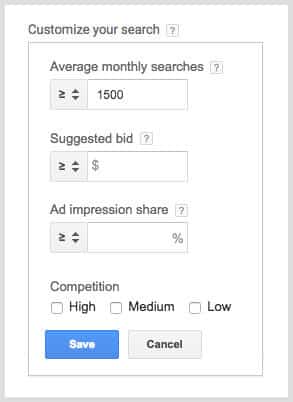
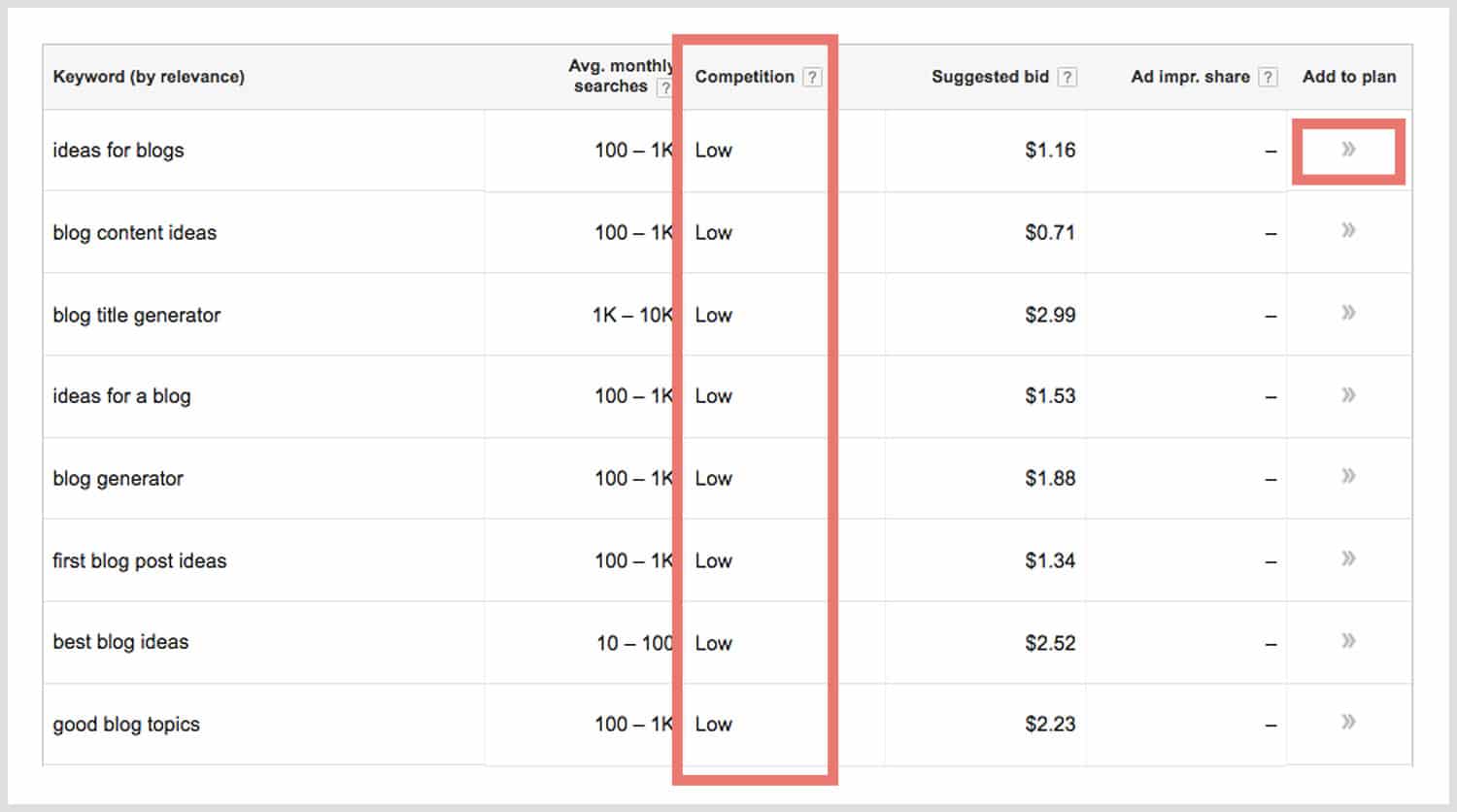
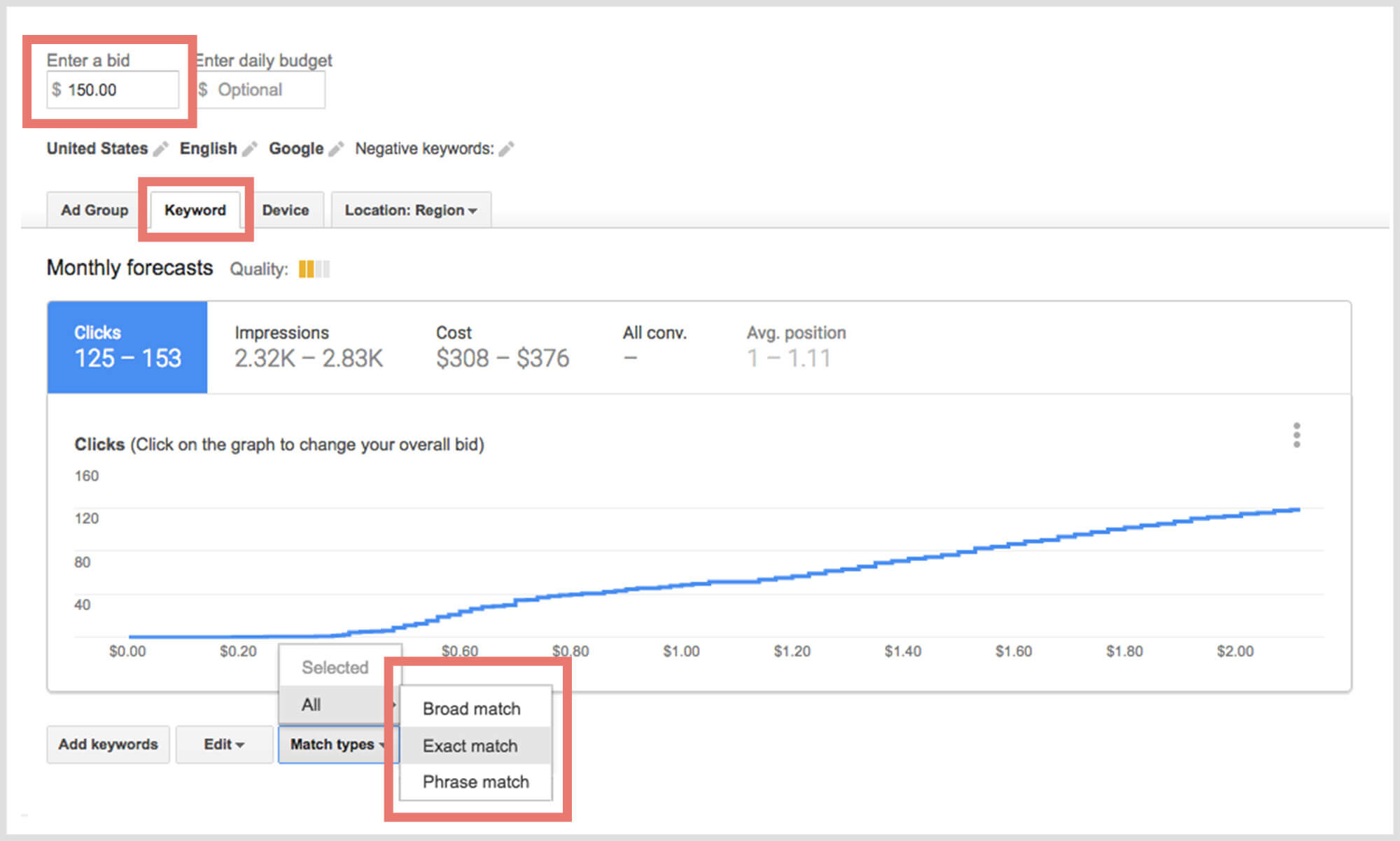
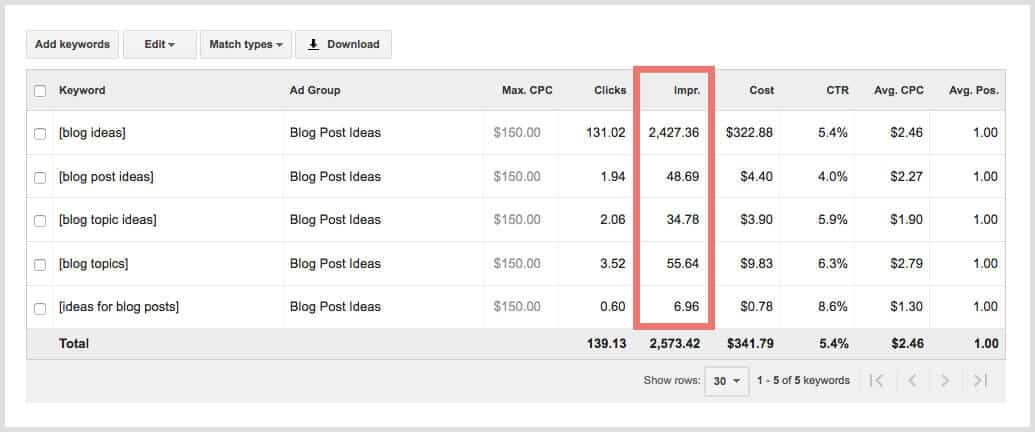
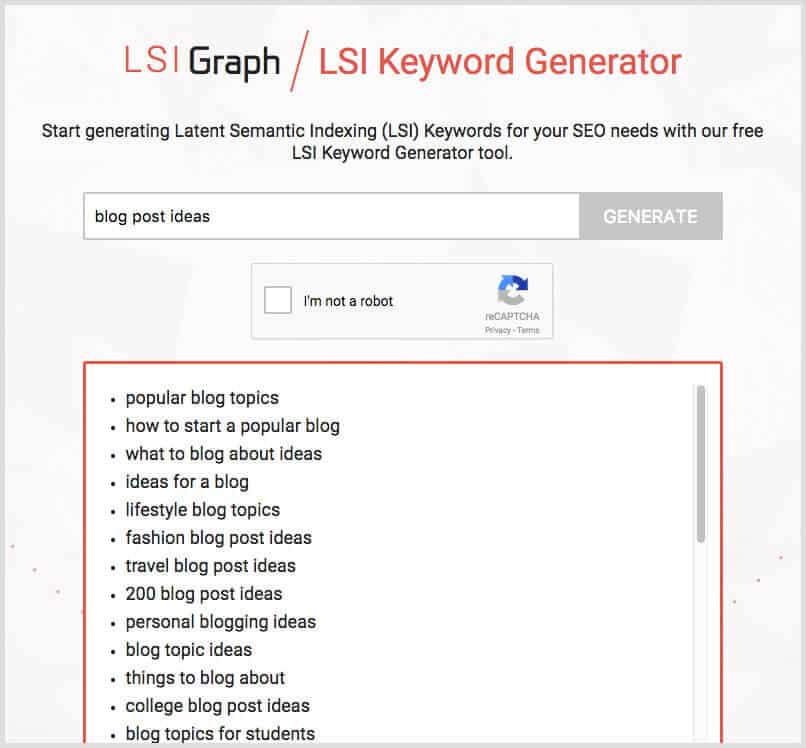


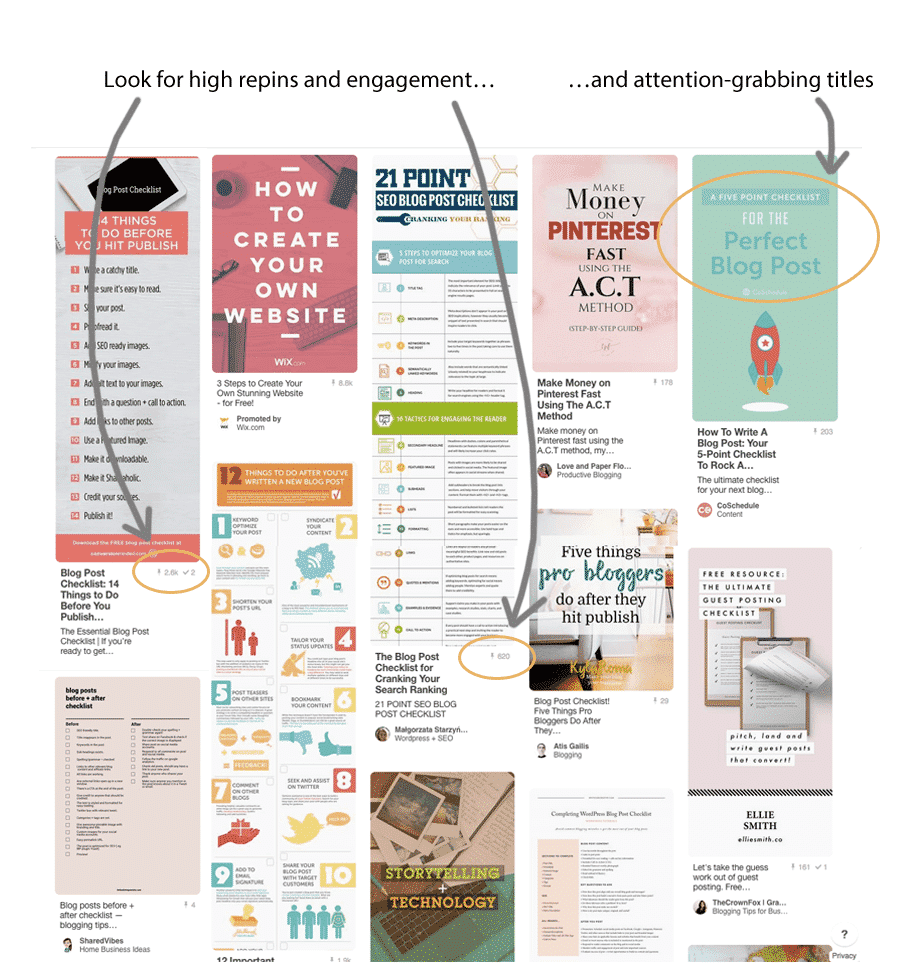
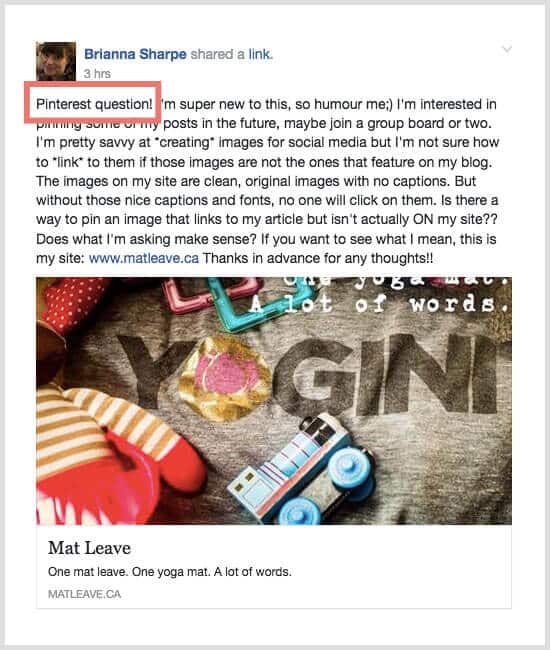
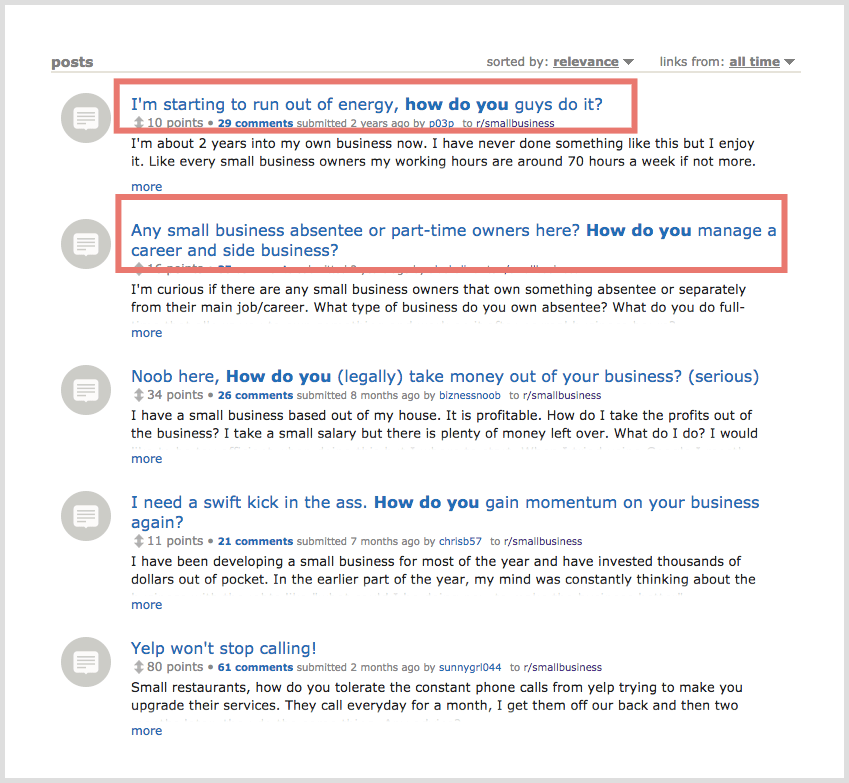
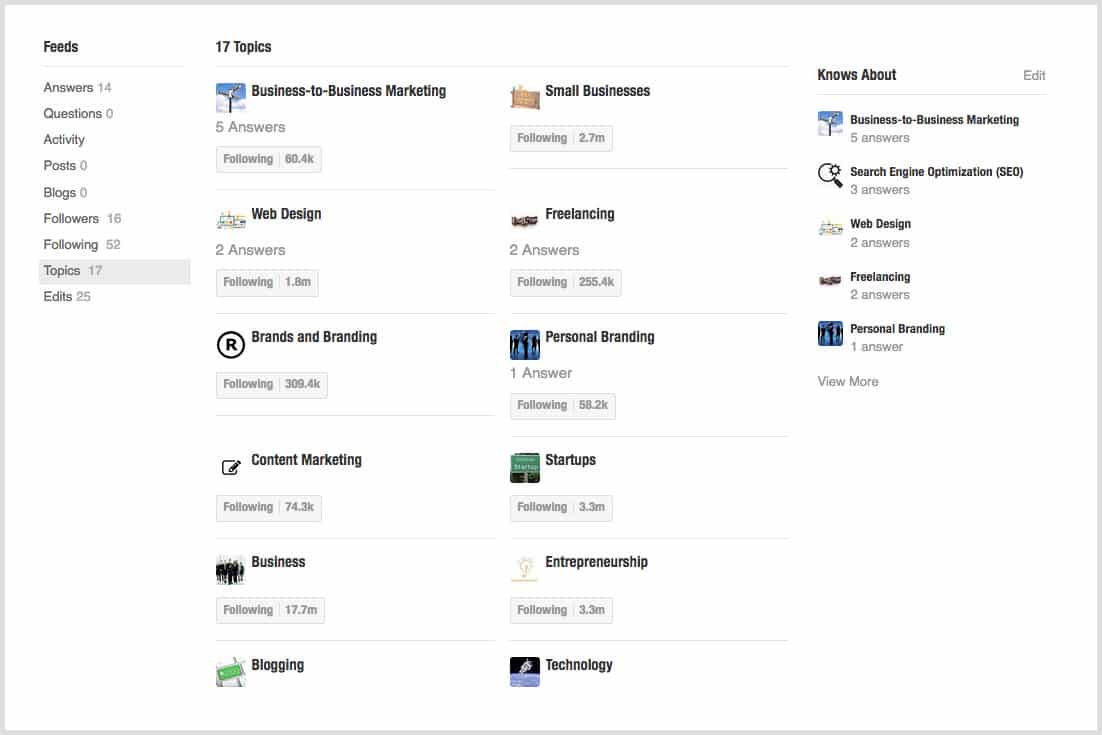
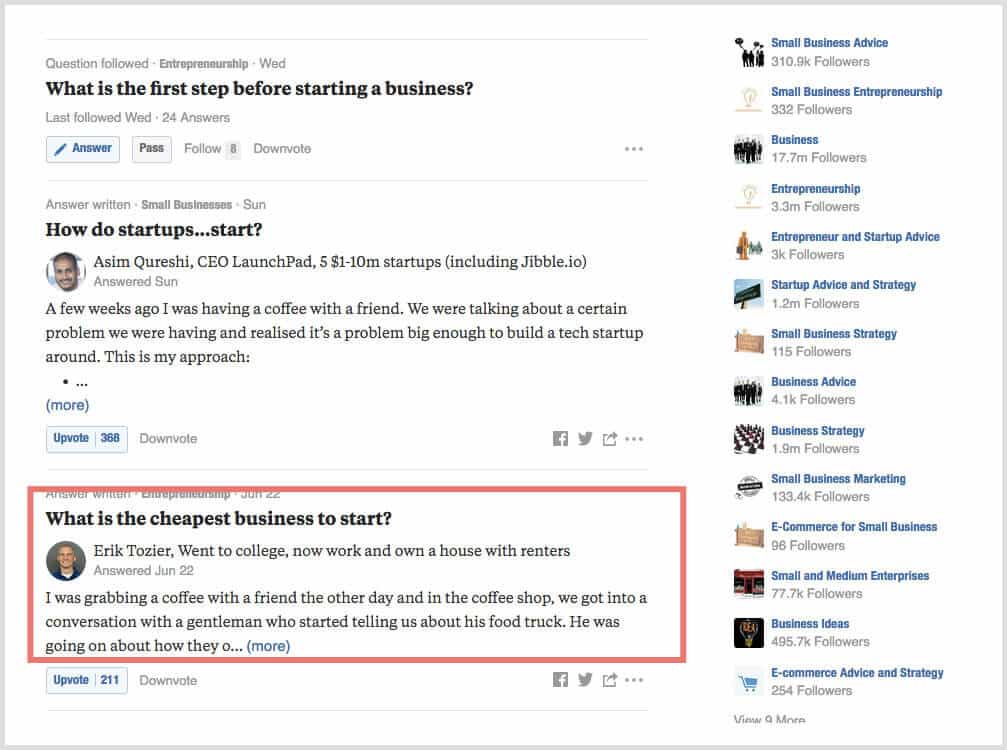
This is great (& overwhelming for a newbie like me) info. Thanks so much for sharing. I’m bookmarking this page to revisit.
You’re so welcome, Jenny.
Thank you so much for the tips. I use Google, BuzzSumo & Pinterest for my new blog post ideas.
We can connect on pinterest (https://www.pinterest.com/JoseyMras) & any other social network to continue learning + sharing
Regards.
A very useful article. It’s simple and easy-to-understand. thanks for sharing.
You’re so welcome, Harshad.
Your information is so great! I’ve been on your website for over an hour now just pouring over all the great tips. Some of it I knew, but a lot of your info is new to me and I’ve been blogging for years. I use Pinterest, Repinned, and Buzzsumo to find popular topics. Since Pinterest doesn’t include the number of repins anymore, I use my Tailwind account to schedule…then when similar pins pop up…that’s where the number of repins is visible. I recently found a viral pin tribe in Tailwind to find highly popular pins. I plan on using this to find popular topics to blog about as well.
Hey Melissa! I love your blog, especially your post on Linda’s Stuff. I buy from her all the time. She’s got amazing clothes… I was wondering what happened to repin counts, so thanks for the tip on viral pin tribes. I’ll have to add to the post.
Waoo, that was huge.
Thanks for sharing.
Sandra, your posts are pure gold! Thanks for the information you provide and the work you put into your posts.
Hey Steve, thanks for your kind words!
Absolutely brilliant! Thank you for sharing your valuable insight.
I am new to blogging. I created my blog content calendar based on questions that I had when I was getting started as a new entrepreneur. As I’m learning & implementing, I journal my observations, lessons, failures and successes. Based on these notes I started my blogging journey.
Looking forward to applying your recommended tips. Thanks again!
You’re so welcome, Praneet. And you’re on the right track! Writing blog posts around your own challenges and questions is the perfect place to start because it’s likely that your readers will have similar questions. I still approach my blogging that way – when I “crack the nut” on something, I write about it so I can help my readers too. I wish you the best of success with your blog! I’m sure you’ll be successful with it 🙂
Thanks for the great tips. We are using BuzzSumo & Pinterest for new blog post ideas.
Love those!
This is just the information I’ve been looking for Sandra. Now I can focus on taking a few actionable steps for my business. It’s so much easier having this information laid out in an outlined format, it’s just like a blueprint.
Amazing post. I tried all the resources and they are so helpful.
Sandra, you have explained each point in such a simple way that it has helped me to understand properly. Thank you for sharing such great information.